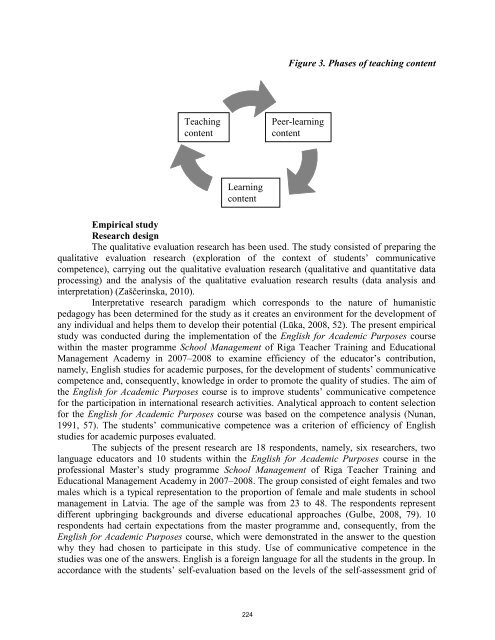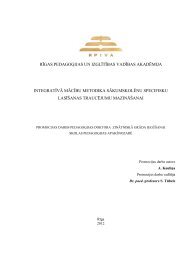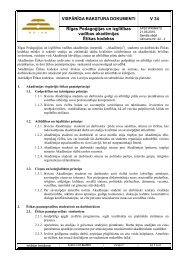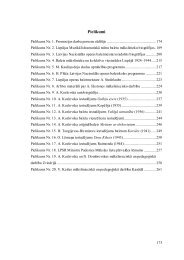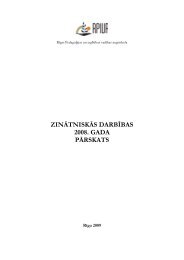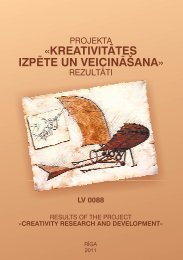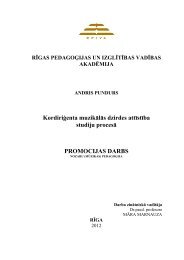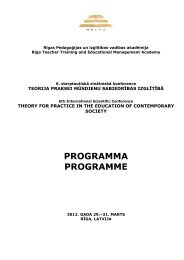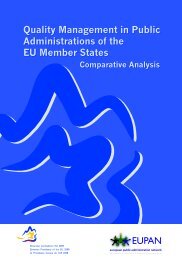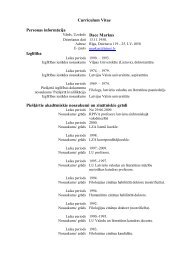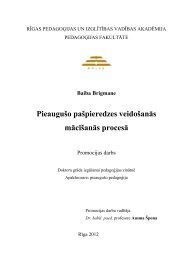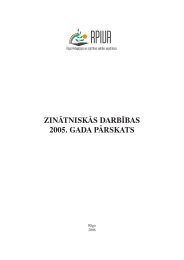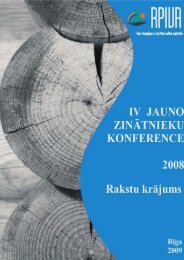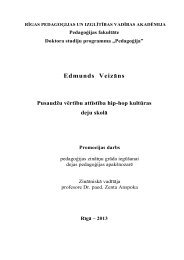saturs - rpiva
saturs - rpiva
saturs - rpiva
- No tags were found...
Create successful ePaper yourself
Turn your PDF publications into a flip-book with our unique Google optimized e-Paper software.
Figure 3. Phases of teaching content<br />
Teaching<br />
content<br />
Peer-learning<br />
content<br />
Learning<br />
content<br />
Empirical study<br />
Research design<br />
The qualitative evaluation research has been used. The study consisted of preparing the<br />
qualitative evaluation research (exploration of the context of students’ communicative<br />
competence), carrying out the qualitative evaluation research (qualitative and quantitative data<br />
processing) and the analysis of the qualitative evaluation research results (data analysis and<br />
interpretation) (Zaščerinska, 2010).<br />
Interpretative research paradigm which corresponds to the nature of humanistic<br />
pedagogy has been determined for the study as it creates an environment for the development of<br />
any individual and helps them to develop their potential (Lūka, 2008, 52). The present empirical<br />
study was conducted during the implementation of the English for Academic Purposes course<br />
within the master programme School Management of Riga Teacher Training and Educational<br />
Management Academy in 2007–2008 to examine efficiency of the educator’s contribution,<br />
namely, English studies for academic purposes, for the development of students’ communicative<br />
competence and, consequently, knowledge in order to promote the quality of studies. The aim of<br />
the English for Academic Purposes course is to improve students’ communicative competence<br />
for the participation in international research activities. Analytical approach to content selection<br />
for the English for Academic Purposes course was based on the competence analysis (Nunan,<br />
1991, 57). The students’ communicative competence was a criterion of efficiency of English<br />
studies for academic purposes evaluated.<br />
The subjects of the present research are 18 respondents, namely, six researchers, two<br />
language educators and 10 students within the English for Academic Purposes course in the<br />
professional Master’s study programme School Management of Riga Teacher Training and<br />
Educational Management Academy in 2007–2008. The group consisted of eight females and two<br />
males which is a typical representation to the proportion of female and male students in school<br />
management in Latvia. The age of the sample was from 23 to 48. The respondents represent<br />
different upbringing backgrounds and diverse educational approaches (Gulbe, 2008, 79). 10<br />
respondents had certain expectations from the master programme and, consequently, from the<br />
English for Academic Purposes course, which were demonstrated in the answer to the question<br />
why they had chosen to participate in this study. Use of communicative competence in the<br />
studies was one of the answers. English is a foreign language for all the students in the group. In<br />
accordance with the students’ self-evaluation based on the levels of the self-assessment grid of<br />
224


